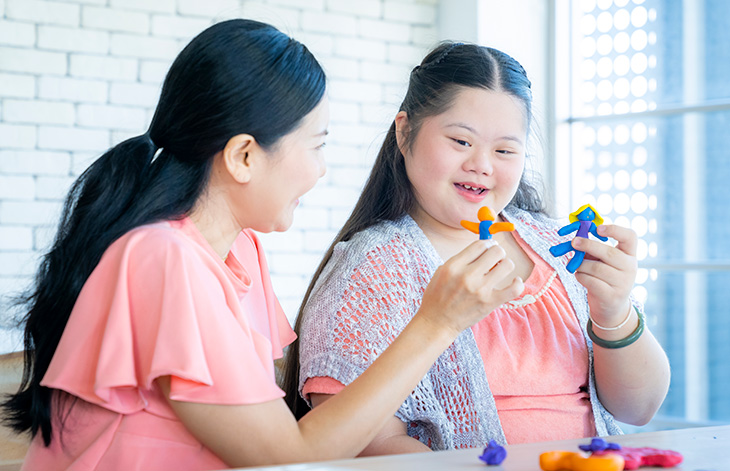Everyday mindfulness for self-care: Tips for parents
Parents and caregivers of children with autism, ADHD and more can build resilience by practicing mindful awareness
Parenting is tough, and research shows that parents of children with autism and other developmental disabilities may experience increased levels of stress.
“Parents often have challenges related to the child’s challenges with self-regulation, social and communication skills,” explained Abirami Duraiswamy, a patient navigator at the UC Davis MIND Institute. Duraiswamy is also a co-facilitator for “GET MINDFUL,” a MIND Institute online self-care and support group for parents of autistic children and those with other developmental disabilities.
“We as parents also have the responsibility of advocacy. Navigating the service system is probably one of the most difficult things parents face in their lifetimes,” Duraiswamy added.
She notes that all of this makes self-care, self-compassion and support especially important for parents. A regular mindfulness practice is one way to build resilience.
In this Q&A, Duraiswamy shares some tips for building mindful awareness into our everyday lives.

What is mindfulness?
Mindfulness, or mindful awareness, is being fully present in the moment, aware of your thoughts, sensations and environment in a non-judgmental way. It helps you get in touch with your own needs and to build a self-care routine.
Mindfulness has three components: intention, attention and attitude.
Let’s say, for instance, I’m talking to you. I intend to be present and I’m paying attention, but I have a thought that’s coming up. At that moment, I come back to the intention and attention without any judgment.
Practicing mindful awareness exercises helps us respond to situations in a way that is guided by our values rather than reactively or impulsively.” —Abirami Duraiswamy, patient navigator
How can mindfulness help with parenting?
Paying attention on purpose and without judgment helps us self-regulate and it further helps us co-regulate with our child.
I am a parent of a neurodivergent child, and there are times that are challenging. Sometimes I’m talking to my son and I am experiencing difficulty communicating with him. I’m paying attention and I intend to be there, but I’m having thoughts that are not helping me in the conversation with my son. Through mindfulness, I get back to paying attention to what he is saying without any attitude or judgment. That’s been very helpful on my own personal journey.
What tools are there to help parents become more mindful?
- Breathing meditation: This is a powerful mindful awareness exercise. You can do this anytime — in a meeting or an elevator. All you have to do is focus on your breathing: Inhale and then exhale, creating awareness of the breath and of your body.
- Five senses exercise: Say you’re overwhelmed and having feelings of anxiety. Stop and look at five things around you that you can see, four things you can touch, three things you can hear, two that you can smell and one that you can taste. You can just swallow and that’s it — it’s as simple as that.
- Body scan: You can either do this lying down or in a seated position. Preferably start with your eyes closed. Start with your feet and notice any sensations you feel, without judgment. Pay attention to any sensations in your toes, ankles, legs, knees, hips, waist, belly, chest, neck and face.
Practicing mindful awareness exercises helps us respond to situations in a way that is guided by our values rather than reactively or impulsively.

How often should we practice these techniques?
The beauty of mindful awareness is that you don’t really have to allocate time for it. You can practice it anytime. It is a skill that can be developed with practice like any other skill, be it drawing or playing the piano. There will be days when you feel overwhelmed. Remember, that’s when those three components come in, the intention, attention and attitude.
It's also important to seek out support. Support groups like GET MINDFUL, which is for parents of children with neurodevelopmental disabilities, go a long way. They help to cultivate self-compassion, which has three components: the mindfulness, the common humanity piece and the self-kindness that we show ourselves.
To learn more about the Get Mindful support group, email hs-mindfnp@ucdavis.edu.

